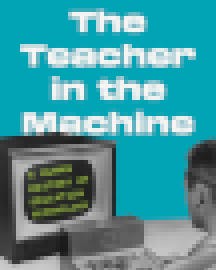Writing a history that you helped to create is awkward, as Anne Trumbore acknowledges in her new book “The Teacher in the Machine: A Human History of Education Technology.” Yet as one of the many hardworking, unsung “humans in the loop,” as she calls them, who made the dream of mass education a reality, Trumbore was uniquely positioned to tell the edtech story.
For Trumbore, it started in 2004, when she went to Stanford to work for Patrick Suppes, who had been studying computer-assisted learning since the 1960s. She began by designing a web-based grammar program before joining the team that created the Stanford Online High School. In 2012, she moved to Coursera, then an experimental startup struggling to bring Massive Open Online Courses (MOOCs) to students around the world. She also worked at NovoEd, another online learning platform. By 2015, Trumbore was at the University of Pennsylvania running Wharton Online. Today, she leads the lifelong learning online certificate program for the University of Virginia’s Darden School of Business.
“I have been an ensemble player in the transformation of online education from experimental and low status to ‘innovative’ and ‘disruptive,’” she writes.
“I have also,” she adds ruefully, “helped to make wealthy institutions, venture capitalists, and more than a few professors even wealthier.”
In “Teacher in the Machine,” Trumbore traces edtech’s beginnings to three professors at distinct schools: Suppes, who founded the Computer Curriculum Corp. in 1967 to produce computerized learning equipment; Donald Bitzer at the University of Illinois, developer of PLATO, the computer-based learning system of the ’60s, ’70s and ’80s that introduced online discussion boards and, later, the framework for social networking; and Seymour Papert at the Massachusetts Institute of Technology who, with his colleague Marvin Minsky in the late 1960s, devised vital early research on artificial intelligence by studying how humans learned.
Suppes and Papert had opposing views of how the computer and technology should function in education. Suppes was shooting for a kind of super tutor — the “individual Aristotle,” he called it — that could guide the student through any problem. Papert favored the computer as a super tool, with the student instructing the machine to solve a problem.
Trumbore explores how edtech evolved from a field governed by Suppes’ vision, from simple computer games to the large-scale teaching model of MOOCs, into an industry that today looks more like Papert’s vision, with programs such as Scratch and other tools of the maker movement and even ChatGPT becoming classroom norms.

At the same time, she reveals another, parallel history — not quite a dark side, but one that isn’t entirely bright, either. That story concerns the tendency of major players to favor technology over human teachers, to reward hype and innovation instead of building on evidence-based research, and to devote more hours to commercializing ideas at the expense of learners or to devise programs that mostly benefited students who were already well off. These propensities created “an edtech innovation ecosystem whose members — from product designers to entrepreneurs to venture capitalists — are astonishingly nondiverse, and ultimately leaving the most vulnerable learners behind,” Trumbore writes.
EdSurge spoke with Trumbore about what “The Teacher in the Machine” tells us about approaches to edtech and what the future holds in the age of ChatGPT.
This interview has been edited for length and clarity.
EdSurge: You describe periods, early in your edtech career, when you were working around the clock, feeling stressed out all the time. Why did you stick with it?
Anne Trumbore: I have been extremely fortunate because I’ve always been in teams of people who have probably less fear than they should have about a vision for the future and their ability to create it. I really thrive in those environments.
[At Stanford] we got a grant to start an online high school. It really showed me the benefit of technology. That kind of turned the knob in my head to make me see the possibilities of education technology.
Up until that point, it was very much asynchronous. In creating the online high school, having the first class ever of eighth graders or ninth graders [online], you really got to know the people on the other side of the screen — not just the students, but their parents who were taking this leap with you.
We weren’t paid very much. And that was probably why we had so much fun. It was just ‘how are we gonna figure out how to do right by these kids?’
This was the early 2000s?
Yes. I think the official year was 2007. We started with a pilot of about 20 kids. Stanford was a hotbed of experimentation. There was us doing the online school, and then over at the computer science department, they were trying to build a better blackboard. And then we had iTunes U, the first online school at scale. [Stanford was an early partner and provided content to iTunes U.]
And it was the provost at the time, John Etchemendy, who brought all of these groups together at a faculty meeting in 2012, which I describe in the book, to say, ‘Hey, there may be something here. We are working with 12-year-olds through to 80-year-olds, none of whom might ever set foot on campus. What is gonna happen now?’
So there was this constant dialogue and mix of, you know, what could we try? How do we drive engagement? How do we make this valuable for students? It was really fun.
I mean, I saw hundreds of people work insane hours and we were not due to get wildly wealthy. But we were so committed to this ideal of access to education and high-quality education.
One problem that emerged once online learning took off is colleges, especially mid-tier colleges, bought technologies in a pack — they bought what everyone else bought. That benefited the edtech companies, but it meant there was little to distinguish one mid-tier college from another. Now, these colleges — you give the example of the University of Arkansas — are heavily invested in online learning, but the courses are run by outside firms, online program management companies, that may absorb as much as 90 percent of the tuition.
Companies took advantage of these schools. I think in the future if colleges can’t reinvent themselves as local, they’re going to have to have a strong enough brand and a strong enough value proposition. There will be some of the smaller liberal arts colleges that have a good brand and offer a good experience. Some of the public schools will survive as they start expanding their offerings and offering more flexible pathways.
Some of them are going to have to become hyperlocal: How are we a service to this community? What do we provide that needs to be in person now that you can get everything online?
I don’t think all of them are going to survive.
A lot of edtech programs today are aimed at the K-12 market.
By corporations who do very little testing to see whether or not those products are safe or effective for children.
The product-makers may have no connection with students …
They think that there is this fundamental idea that the [point] of teaching is to transmit knowledge. That’s why they love the idea of personalization and AI tutors.
The people who are inventing and funding and getting rich off these education technologies really think that the goal, the primary goal, of teaching and education is development of skills. Of course, that can be scaled and standardized.
This drives me nuts about the whole skills movement — hiring based on skills. No. You’re going to have to hire based on capacity. How do you develop the capacity to have empathy, the capacity to listen, the capacity to make meaning? All of those things are uniquely human.
I think we should use technology, but we should use it as a tool, quite deliberately and to amplify what’s human. But amplifying what’s human is not as sure a way to profit as replacing what’s human.
What do you think of the proliferation of AI in education right now?
Google and ChatGPT offered college students free access to use [their AI models]. This is a bottoms-up technology. We are not thinking about the institution, we are not thinking about the school, we are thinking only about the end-user. So we’re going to try and get as many end-users as possible. This is equivalent to people saying we need more welders. So are you going to give every 3-year-old a blowtorch?
There is so much to personalization that we don’t understand. I may learn better, my son may learn better, one to one — for a host of reasons that are not just knowledge transmission and the ability to keep someone engaged. It might be the ability to know when you need to take a break. It could be that I understand that you don’t understand yet.
It’s easy to ask ChatGPT to find out a fact or to create an itinerary. But if you’re trying to understand the nature of the human heart, how do you ask that question to something that is just an assemblage of a bunch of information?
This post is exclusively published on eduexpertisehub.com
Source link

